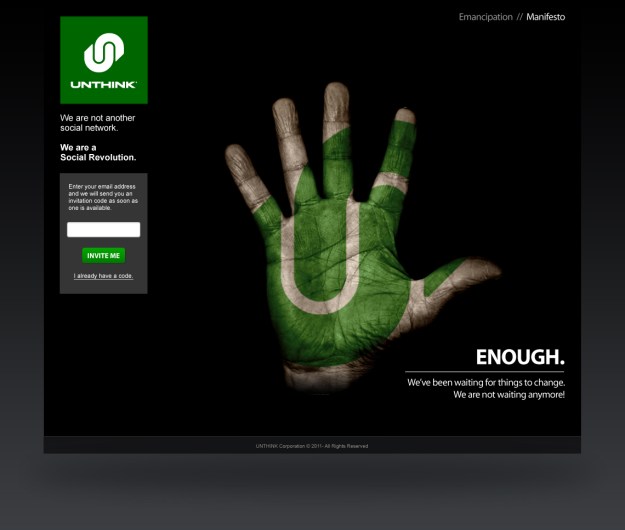
There’s a new social network in town, and it bills itself as everything Facebook’s not. Unthink.com, which opened up registration today for an initial round of beta users, says it is the “anti-Facebook,” and vows to give users complete control over their personal data.
Unthink, which is based in Tampa, Florida, came out swinging, with a manifesto that vows to “emancipate social media,” along with a promotional video that literally says “FU” to Facebook and Google+ for making money by “spying – yes, spying” on users and bombarding users with ads, among other grievances.
According to Unthink chief executive Natasha Dedis, the idea for a new kind of social network came to her in 2007, when her son asked to join Facebook. After reading Facebook’s terms and conditions, as well as the terms of MySpace (which reigned king of social media at the time), Dedis said in an interview with SixEstate that she realized that these companies were operating under a business logic that was “totally irrational and exploitative.”
“…I felt that they were basically taking my son hostage,” said Dedis. “He was giving them a perpetual license to do whatever they wanted, they could change the terms at any time. So I thought, ‘Oh my god, in the real world, no business could ask its clients to enter into such a legal relationship. So how is this even legal on the Web?’ It just baffled me.”
Unthink attempts to tackle the exploitation problem in a number of different ways. First, Unthink makes all user data private by default. Users may then allow others to see the information they want public, and keep private anything they want private. Next, Unthink doesn’t sell user data to companies. Instead, users can choose to have specific brands “sponsor” their pages. Any users who don’t want corporate sponsorship can pay a $2-a-year fee to use the service. In addition, Unthink users may choose how brands communicate with them via a section that’s totally separate from their regular information stream.
As we see it, Unthink faces an inconceivably difficult uphill battle against Facebook and Google+. At the same time, however, Unthink’s servers are, at the time of this writing, completely overwhelmed by the bombardment of traffic headed to the site today. While some may see that as evidence that the company is unprepared for the big leagues, it at least shows that people are interested in a Facebook alternative – something we saw in droves with the launch of Google+.
We’ll definitely be exploring Unthink more in the coming days. In the mean time, check out Unthink’s in-your-face promo video, and let us know what you think of, er, Unthink:
Editors' Recommendations
- Facebook’s new controls offer more customization of your Feed
- Facebook’s new Feeds tab emphasizes chronological posts
- The new ways Meta will pay you to make content for Facebook and Instagram
- 2020 forced Big Social to address its flaws, but it’s too late for an easy fix
- Leading Dem says Apple, Google, Facebook, and Amazon have ‘monopoly power’


